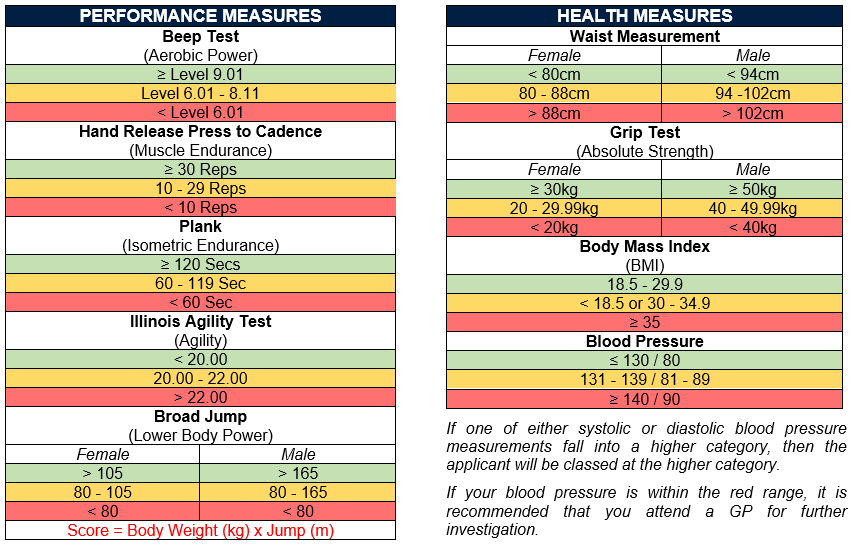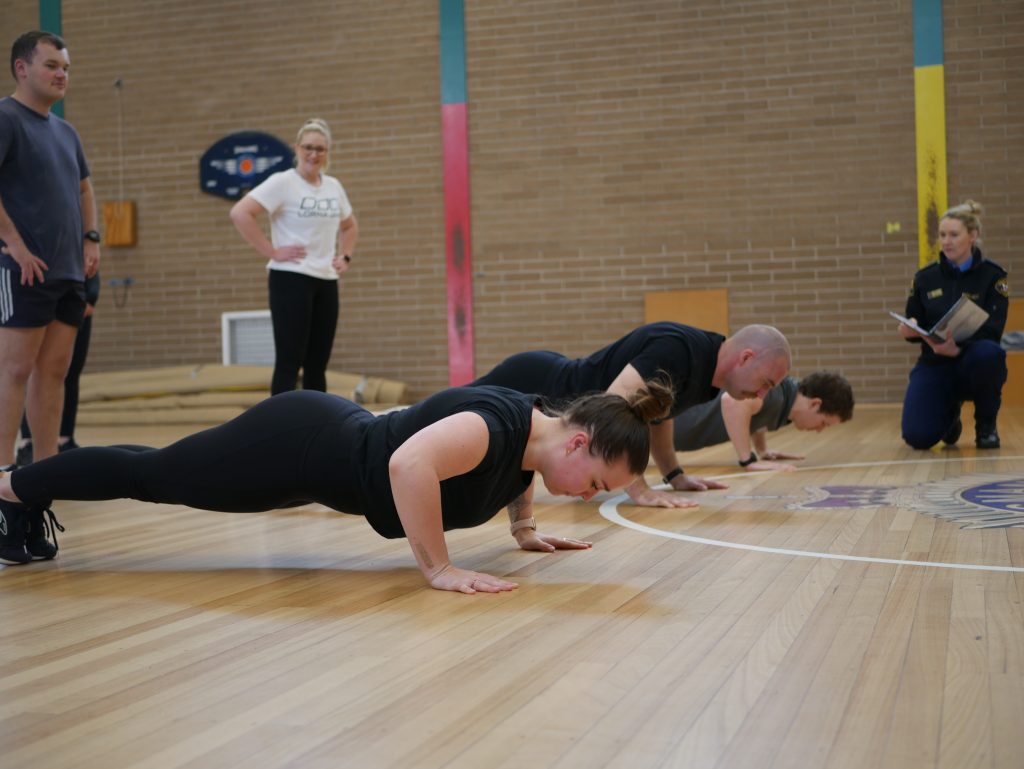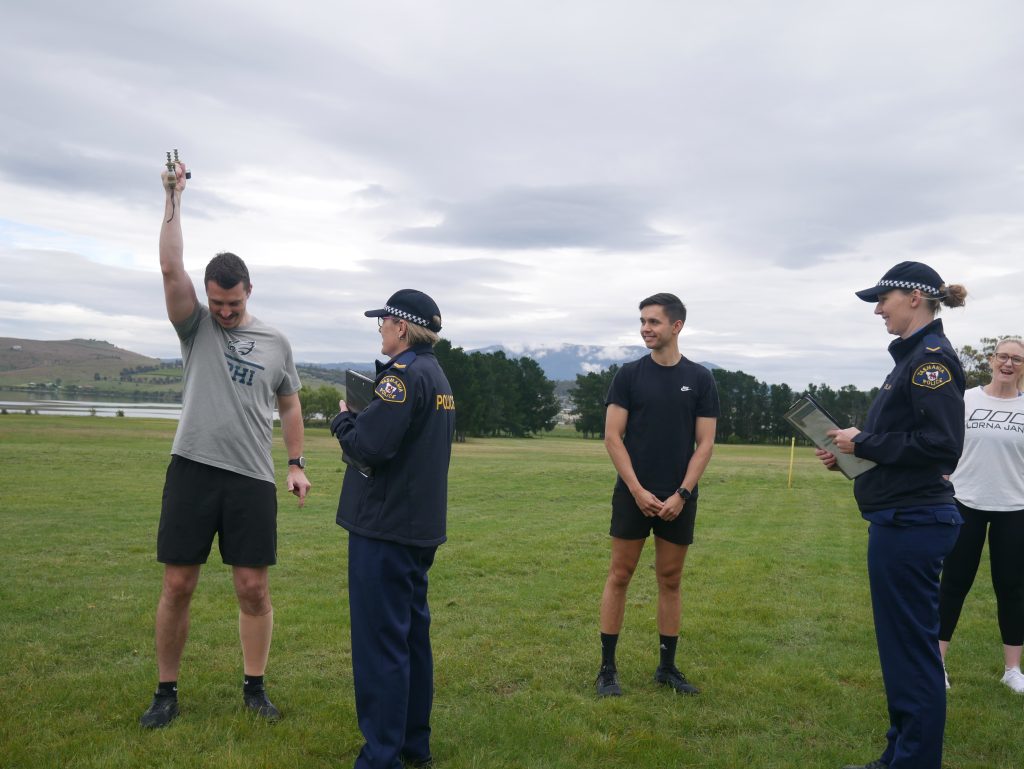Physical Fitness Assessment
The physical fitness assessment tests your ability to handle basic strenuous tasks that police officers perform as part of their duties.
We strongly urge you to train and prepare for this testing, making sure you can reach the minimum requirements before you apply to join Tasmania Police. For basic programs to assist with your fitness please click here.
You will be required to provide photo ID and sign an indemnity form prior to commencing the assessment to confirm that you are fit and well to participate, and that you are not suffering any injury.
You will not be permitted to participate if you are not wearing appropriate clothing and footwear, or if you arrive late.
Fitness Standards
The Tasmania Police Fitness Standards are based on a ‘traffic light’ system. The tests are separated into two categories- performance measures and health measures.
Most of the tests are gender neutral, however for those that are gender specific, this is based on the ‘gender at birth’ of an applicant, unless the applicant advises recruiting staff why this should not be the case.


The tests will be conducted in the following order:
- Broad Jump
- Beep Test
- Illinois Agility Test
- Plank
- Grip Test
- Waist Measurement
- Hand Release Press (to cadence)
The Blood Pressure reading will be obtained by the applicants GP during their medical assessment (post interview stage).
Beep Test
This test measures cardiovascular endurance. Applicants must run between two lines marked 20-metres apart in accordance with a pre-recorded ‘beep’. The beeps will start quite slow during level one and will become faster as the test progresses through the levels.
To successfully complete each shuttle, applicants must break the marked line with at least one foot prior to the beep sounding, or as the beep sounds. If they break the line prior to the beep sounding, applicant’s must wait until the beep sounds before taking off to start the next shuttle. If the beep sounds before the applicant has broken the line, they must complete that unfinished shuttle and break the line for the next shuttle prior to the next beep sounding.
The test will end if the applicant fails to complete two consecutive shuttles, or if they choose to withdraw. Their score will be recorded as the last shuttle they have successfully completed. For example, if a participant completes level 6.5 but misses both 6.6 and 6.7, their score will be recorded as 6.5.
Participants are required to achieve a minimum score of level 6.01 to be considered for entry, while those achieving a score above level 9.01 will be considered a strong applicant.
A copy of the Australian Sports Commission Multi-Stage Fitness Test used by Tasmania Police can be accessed here.
Hand-release Press to Cadence
This test measures the strength and endurance of the torso. Applicants are to begin by lying flat on their stomach with arms outstretched perpendicular to the body.
Each repetition is to be completed in accordance with the beep signalling the 3-second cadence. At each beep, applicants will be required to bring their arms into a push up position, press their entire body off the floor simultaneously, and return to the starting position with arms outstretched ready for the next beep.
The applicants score is the number announced by the recording before their last successful repetition. The test will end if the applicant is physically unable to complete another repetition, if staff indicate that the applicant is no longer completing repetitions with the desired technique, if the applicant fails to reset before the next beep, or if they reach the cap of 40 repetitions.
Applicants are required to achieve a minimum of 10 repetitions to be considered for entry, while those achieving a score above 30 will be considered a strong applicant.
A copy of the 3 second Cadence by Adam Howard used by Tasmania Police can be accessed here.

Plank
This test measures abdominal endurance and core strength. Applicants must adopt a push up position with hands directly under shoulders and a ‘neutral spine’. Their head, shoulders, back, hips and knees should be in alignment.
When asked to do so by staff, applicants must drop into a plank position by replacing their hands with their elbows and maintaining a neutral spine. Their forearms must remain parallel.
The test will begin when staff announce, “Test start”. The test will end when the applicant is physically unable to hold themselves up any longer, when staff indicate that the applicant is no longer in the desired position after having already received one warning, or when a applicant reaches the time cap of two-minutes.
Applicants are required to achieve a minimum of 60-seconds to be considered for entry, while those achieving a score above 120-seconds will be considered a strong applicant.
Illinois Agility Test
This test measures change of direction. Applicants will lie on their front (head to the start line) with hands on top of each other and chin resting on hands.
Staff will indicate applicant may start the test by announcing ‘when you’re ready’. The stopwatch is started when the applicant first initiates movement aimed at getting up off the floor. The applicant must run as quickly as possible to the 10-metre line, turn and then run back 10 meters, run in a weaving motion between the cones up and back. Finally, the applicant runs another 10 metres up and back past the finishing cone, at which the timing is stopped.
Applicants are required to achieve a time below 22-seconds to be considered for entry, while those achieving a score below 20-seconds will be considered a strong applicant.
Broad Jump
This test measures lower body power. Applicants are to begin with feet level and toes behind the start-line as indicated by staff.
Applicants will be required to squat down with arms straight and hands loaded behind them. They will jump forwards as far as possible while throwing their arms. Applicants must ensure both feet leave the floor together and land together, and they should bend their knees to absorb the force upon landing.
Upon landing, applicants may take a step forward or backwards with one foot to maintain balance if required, however the measurement will be taken from the heel of the back-most foot once all movement has ceased. The measurement taken will be the best of two attempts, and this measurement (M) will be multiplied by bodyweight (kg) for the final score.
Applicants are required to achieve a minimum score of 80 to be considered for entry, while males achieving a score above 165 and females achieving a score above 105 will be considered a strong applicant.
Waist Measurement
This test is indicative of heart health and general physical wellbeing. Applicants will be asked to remove or roll up any thick clothing to ensure the result is accurate. They will stand with their feet together and arms outstretched to their sides while a staff member passes a measuring tape around their midsection.
Male applicants measuring between 94-102cm can be considered for entry, while males measuring below 94cm will be considered a strong applicant. Females measuring between 80-88cm can be considered for entry, while females measuring below 80cm will be considered a strong applicant.
Grip Test
This test measures grip strength. Applicants will be asked to hold a grip strength dynamometer in one hand with their arm outstretched overhead. Upon the command from staff, the applicant will squeeze the dynamometer as tightly as possible while moving it steadily towards the ground, ensuring the arm stays fully extended. The dynamometer should arrive at the hip upon the three-second mark, while ensuring a small gap remains between the hip and the hand. The test will then be repeated on the other hand.
Male applicants measuring between 40-49.9kg can be considered for entry, while males measuring at or above 50kg will be considered a strong applicant. Females measuring between 20-29.9kg can be considered for entry, while females measuring at or above 30kg will be considered a strong applicant.

Body Mass Index (BMI)
BMI is the most useful and valid way to test an applicant’s body size. A BMI is calculated by dividing weight in kilograms by the square of height in metres.
A BMI of 18.5 – 34.9 meets our entry requirements.
If an applicant has a BMI of less than 18.5 their application will be assessed by our fitness consultants and possibly a general practitioner, to determine whether they are suitable for the demands of the training.
If an applicant has a BMI above 35 they will not meet the entry requirements.
Should an applicant have an elevated BMI due to higher levels of muscle mass, their application will be assessed by our fitness consultants and possibly their general practitioner.